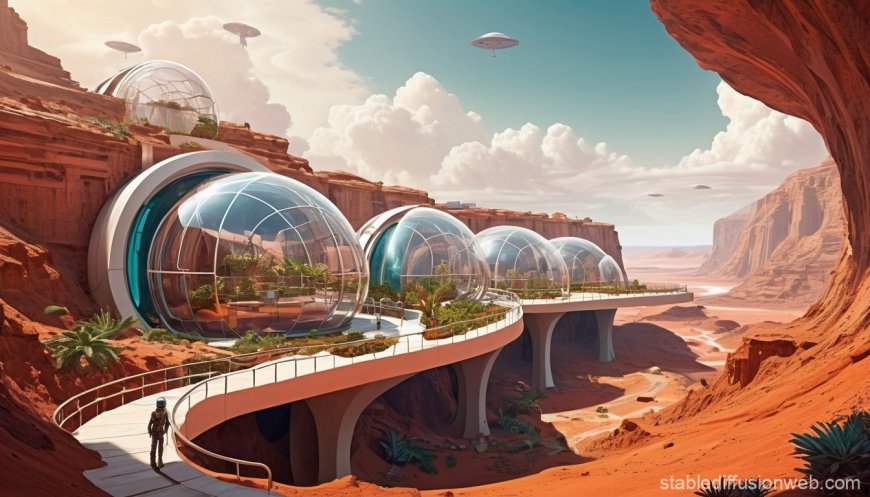Space Colonization: Is Mars Humanity’s Next Home?
Is Mars humanity’s next home? Discover the challenges, benefits, and realistic plans for colonizing the Red Planet. Learn about SpaceX, NASA, and the future of space travel.

For centuries, humans have gazed up at the night sky, wondering if life exists beyond Earth. Now, we’re asking a different question: Can we live beyond Earth?
With climate change, overpopulation, and dwindling natural resources threatening our planet’s future, space colonization is no longer just a sci-fi fantasy—it’s becoming a necessity. Leading scientists, space agencies like NASA and ESA, and private companies like SpaceX are working on ambitious plans to make Mars our second home.
But is this vision realistic? Could humans truly survive and thrive on the Red Planet? Let’s explore what it would take to colonize Mars, the challenges we’d face, and whether it’s really the best option for humanity’s future.
Why Mars?
Out of all the planets in our solar system, Mars is the most Earth-like in terms of conditions that could support human life. Here’s why Mars is our best candidate for colonization:
✅ Closest to Earth
Mars is our next-door neighbor in the solar system, with an average distance of 140 million miles (225 million km). Travel time varies depending on launch windows, but with current technology, a one-way trip takes about 6-9 months.
✅ Survivable Conditions
Mars isn’t exactly hospitable, but it offers conditions that could be adapted for human survival:
- Gravity: About 38% of Earth’s gravity, making it easier for humans to move and lift objects.
- Day Length: A Martian day ("sol") is 24 hours and 37 minutes, similar to Earth's.
- Water Ice: Large deposits of frozen water exist beneath the surface, which could be melted for drinking water and oxygen production.
✅ Potential for Terraforming
While still theoretical, scientists believe Mars could be terraformed—meaning we could modify its atmosphere to make it more Earth-like over time.
The Challenges of Living on Mars
Despite its potential, Mars presents massive challenges for human colonization. Here’s what we’d need to overcome:
❌ Harsh Climate & Thin Atmosphere
Mars has an atmosphere 100 times thinner than Earth’s, meaning:
- Breathing is impossible—humans would need spacesuits or pressurized habitats with oxygen.
- The lack of atmospheric protection allows harmful solar and cosmic radiation to reach the surface.
- Temperatures can drop to -80°F (-60°C) on average, with even colder nights.
❌ Deadly Dust Storms
Mars is infamous for massive dust storms that can last weeks or even months, blocking sunlight and disrupting solar-powered systems.
❌ No Magnetic Field = High Radiation Exposure
Unlike Earth, Mars lacks a strong magnetic field, meaning dangerous radiation from the sun and space constantly bombards the surface. Long-term exposure could cause cancer, genetic mutations, and neurological damage.
❌ Lack of Natural Resources
Unlike Earth, Mars doesn’t have easy access to essential resources like food, fuel, and building materials. Colonists would need advanced technology to extract resources from the Martian soil and atmosphere.
How Would We Colonize Mars?
While the challenges are daunting, scientists and engineers have proposed several realistic steps to make Martian colonization possible:
1️⃣ Transportation: Getting to Mars
???? SpaceX’s Starship is currently the most promising spacecraft designed for Mars travel. Capable of carrying up to 100 passengers, it could make regular trips once refueling stations are established in space.
2️⃣ Building Habitats
???????? Astronauts would need pressurized domes or underground shelters to protect against radiation and extreme temperatures. Scientists are considering 3D-printing habitats using Martian regolith (soil) to reduce the need to bring building materials from Earth.
3️⃣ Producing Oxygen and Water
???? NASA’s MOXIE experiment on the Perseverance rover has already shown that oxygen can be extracted from Mars’ CO₂-rich atmosphere. Water ice beneath the surface could also be harvested and purified.
4️⃣ Growing Food on Mars
???? Since transporting food from Earth isn’t sustainable, future colonists would need to grow crops using hydroponics or Martian soil enriched with nutrients. Experiments on the International Space Station (ISS) have already proven that plants can grow in microgravity.
5️⃣ Generating Power
???? Solar panels are a primary option, but because of dust storms, nuclear reactors might be needed for a reliable energy source.
When Could Humans Live on Mars?
Elon Musk and SpaceX are pushing for the first human mission to Mars by the 2030s, with the long-term goal of establishing a self-sustaining colony. NASA and other agencies have similar timelines, but large-scale colonization is likely decades away—possibly by the 2050s or later.
The timeline depends on:
???? Advancements in space travel – Faster spacecraft could shorten the trip.
???? Improved habitat technology – Safe, radiation-proof shelters are crucial.
???? Funding and global cooperation – Colonizing Mars is expensive, requiring billions in investment.
Is Mars the Best Option for Colonization?
Mars is our most practical choice right now, but some scientists argue we should consider other locations:
- The Moon – Closer and easier to reach, the Moon could serve as a "practice colony" before Mars.
- Europa (Jupiter’s Moon) – Has a subsurface ocean, which could support life.
- Exoplanets – In the distant future, Earth-like planets outside our solar system could be explored.
For now, Mars remains the best candidate—but colonization efforts must be carefully planned to ensure safety and long-term survival.
Final Thoughts: Is Mars Humanity’s Future?
Colonizing Mars is one of the greatest challenges and opportunities in human history. If successful, it could ensure the survival of our species, expand our reach into the cosmos, and mark a new era of interplanetary civilization.
While the journey will be long and difficult, the spirit of exploration and innovation that has driven humanity for centuries makes Mars colonization an inevitable step forward. The question is no longer if, but when.
Are we ready to take that giant leap? ????
What's Your Reaction?
 Like
0
Like
0
 Dislike
0
Dislike
0
 Love
0
Love
0
 Funny
0
Funny
0
 Angry
0
Angry
0
 Sad
0
Sad
0
 Wow
0
Wow
0



















































